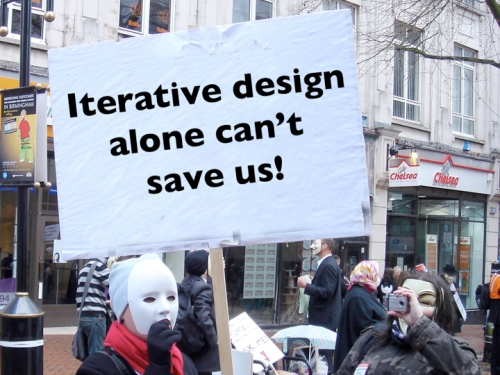Harry Brignull’s post (Why you shouldn’t rush into a solution too quickly) about my OZIA presentation reminds me that I promised to extract a few of the key messages from the presentation and blog about them myself.
The key message of the presentation was Iterative design alone can’t save us.

As you can probably guess from the main theme, my argument was that we must ground our work in a rich understanding of the context of use, or else we run the risk of creating well meaning rubbish.
I argued that although an essential ingredient in good user centred design, iterative design alone can’t stop us from creating bad products.
To make my point, I cited the highly iterative, but decidedly non-contextual development of the UK Government’s SA80 rifle. The rifle was developed over a number of years and involved much testing at firing ranges.
The problem was that the testing was conducted under far too controlled conditions. The rifles were carefully caried out to the firing range, rather than being dragged around in the real conditions in which they would need to operate. The result being that when the product was ‘launched’ it still had major (**major**) issues. Such as:
- Couldn’t be fired from the left shoulder
- It went off when dropped
- Safety catch would break if the trigger was pulled hard
- Plastic would swell in rain and jam the safety switch on/off
- When running a heavy ammunition magazine would fall out
My argument being if we only conduct iterative design in controlled usability testing labs, using pre-defined tasks then what is to stop our projects going the same way as the SA80?
My full presentation is fairly visual rather than textual, so it may not make sense out of context (chortle).
The information about the SA80 project comes from James Meek’s excellent article, Off target, from a few years back in the Guardian.
